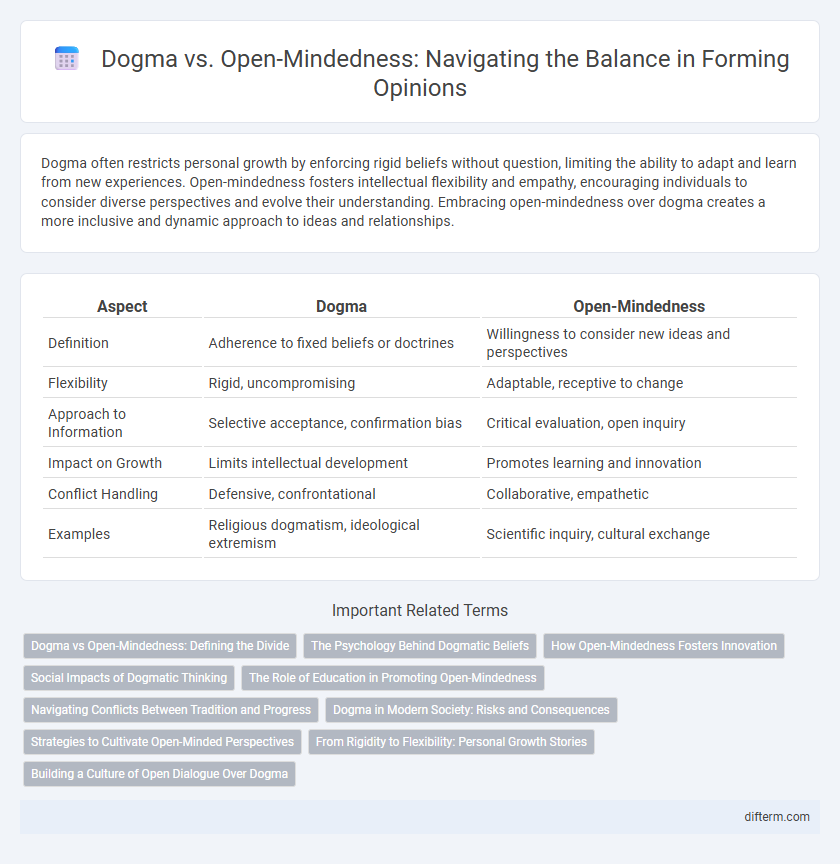Dogma often restricts personal growth by enforcing rigid beliefs without question, limiting the ability to adapt and learn from new experiences. Open-mindedness fosters intellectual flexibility and empathy, encouraging individuals to consider diverse perspectives and evolve their understanding. Embracing open-mindedness over dogma creates a more inclusive and dynamic approach to ideas and relationships.
Table of Comparison
| Aspect | Dogma | Open-Mindedness |
|---|---|---|
| Definition | Adherence to fixed beliefs or doctrines | Willingness to consider new ideas and perspectives |
| Flexibility | Rigid, uncompromising | Adaptable, receptive to change |
| Approach to Information | Selective acceptance, confirmation bias | Critical evaluation, open inquiry |
| Impact on Growth | Limits intellectual development | Promotes learning and innovation |
| Conflict Handling | Defensive, confrontational | Collaborative, empathetic |
| Examples | Religious dogmatism, ideological extremism | Scientific inquiry, cultural exchange |
Dogma vs Open-Mindedness: Defining the Divide
Dogma rigidly confines beliefs within unchanging principles, often resisting new evidence or perspectives. Open-mindedness fosters intellectual flexibility, encouraging continuous learning and adaptation to diverse viewpoints. This fundamental divide shapes how individuals process information and engage in critical thinking.
The Psychology Behind Dogmatic Beliefs
Dogmatic beliefs often stem from cognitive biases such as confirmation bias and the need for cognitive closure, which reinforce rigid thinking patterns and resist contradictory evidence. This psychological rigidity can hinder personal growth, limit perspective-taking, and entrench ideological divides. Understanding the neural mechanisms behind these beliefs, including reduced activity in the prefrontal cortex linked to critical thinking, highlights the challenge of fostering open-mindedness in dogmatic individuals.
How Open-Mindedness Fosters Innovation
Open-mindedness fosters innovation by encouraging the exploration of diverse ideas and challenging established dogmas that limit creative thinking. Embracing varied perspectives leads to adaptive problem-solving and breakthrough advancements in technology and science. Innovation thrives in environments where questioning assumptions is valued over rigid adherence to traditional beliefs.
Social Impacts of Dogmatic Thinking
Dogmatic thinking restricts social progress by fostering intolerance and reinforcing divisions within communities. It limits dialogue, discourages diverse perspectives, and often perpetuates prejudice and misinformation. Open-mindedness enables collaboration and innovation, creating more inclusive and adaptable societies.
The Role of Education in Promoting Open-Mindedness
Education serves as a critical tool in fostering open-mindedness by encouraging critical thinking and exposing students to diverse perspectives and cultures. When curricula prioritize inquiry-based learning and intellectual curiosity, they challenge dogmatic beliefs and promote adaptability in thought processes. By equipping learners with analytical skills, education cultivates a more tolerant and inclusive society capable of navigating complex global issues.
Navigating Conflicts Between Tradition and Progress
Navigating conflicts between tradition and progress requires balancing respect for established dogma with openness to new ideas. Embracing open-mindedness fosters innovation and cultural evolution, challenging rigid beliefs that can hinder growth. Prioritizing dialogue and critical thinking helps reconcile differences and promotes societal advancement.
Dogma in Modern Society: Risks and Consequences
Dogma in modern society often restricts critical thinking and suppresses innovation, leading to intellectual stagnation and societal polarization. Rigid adherence to dogmatic beliefs can foster intolerance, limit dialogue, and exacerbate conflicts within diverse communities. The risks include undermining democratic values and hindering progress by discouraging open inquiry and adaptability.
Strategies to Cultivate Open-Minded Perspectives
Cultivating open-minded perspectives requires deliberate strategies such as actively seeking diverse viewpoints, practicing empathetic listening, and questioning personal biases to challenge dogmatic thinking. Engaging with unfamiliar ideas through reading, dialogue, and reflection broadens cognitive flexibility and fosters intellectual humility. Creating environments that encourage curiosity and respectful debate supports sustained openness and adaptability in thought.
From Rigidity to Flexibility: Personal Growth Stories
Rigid adherence to dogma often limits personal growth by constraining perspectives within fixed boundaries. Embracing open-mindedness fosters adaptability and intellectual flexibility, enabling individuals to evolve through diverse experiences and challenges. Personal growth stories frequently illustrate transformative shifts from strict dogmatic beliefs to a more exploratory and empathetic understanding of the world.
Building a Culture of Open Dialogue Over Dogma
Building a culture of open dialogue fosters critical thinking and innovation by encouraging diverse perspectives rather than rigid dogma. Emphasizing curiosity and respect in conversations helps dismantle echo chambers and promotes collective growth. Organizations prioritizing transparency and inclusive communication experience higher employee engagement and creative problem-solving.
dogma vs open-mindedness Infographic

 difterm.com
difterm.com